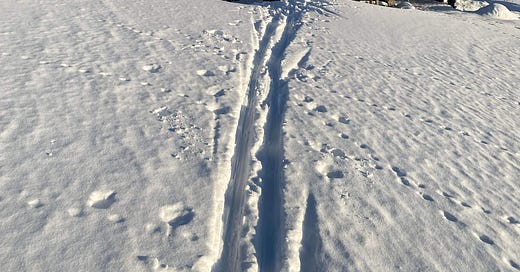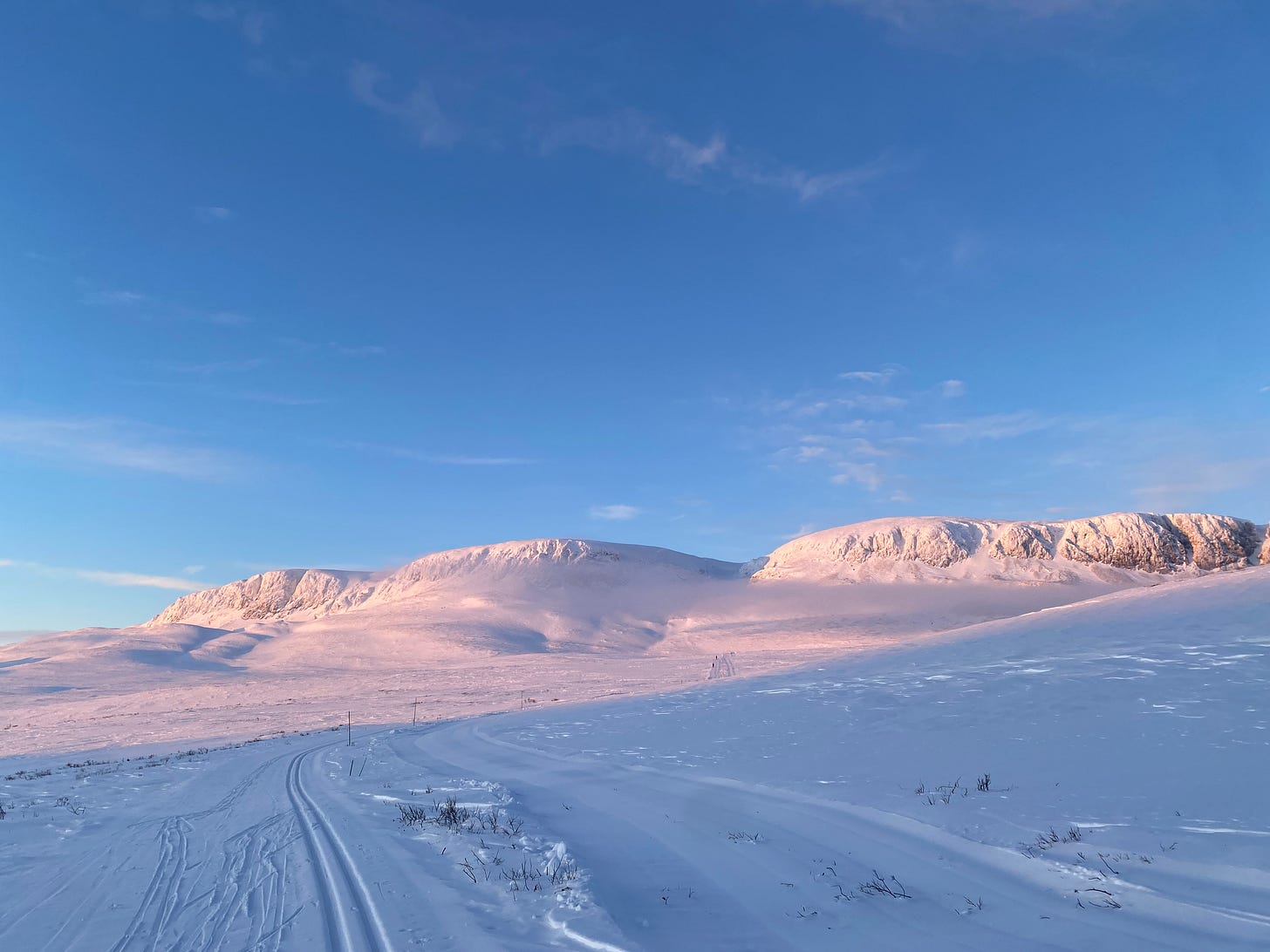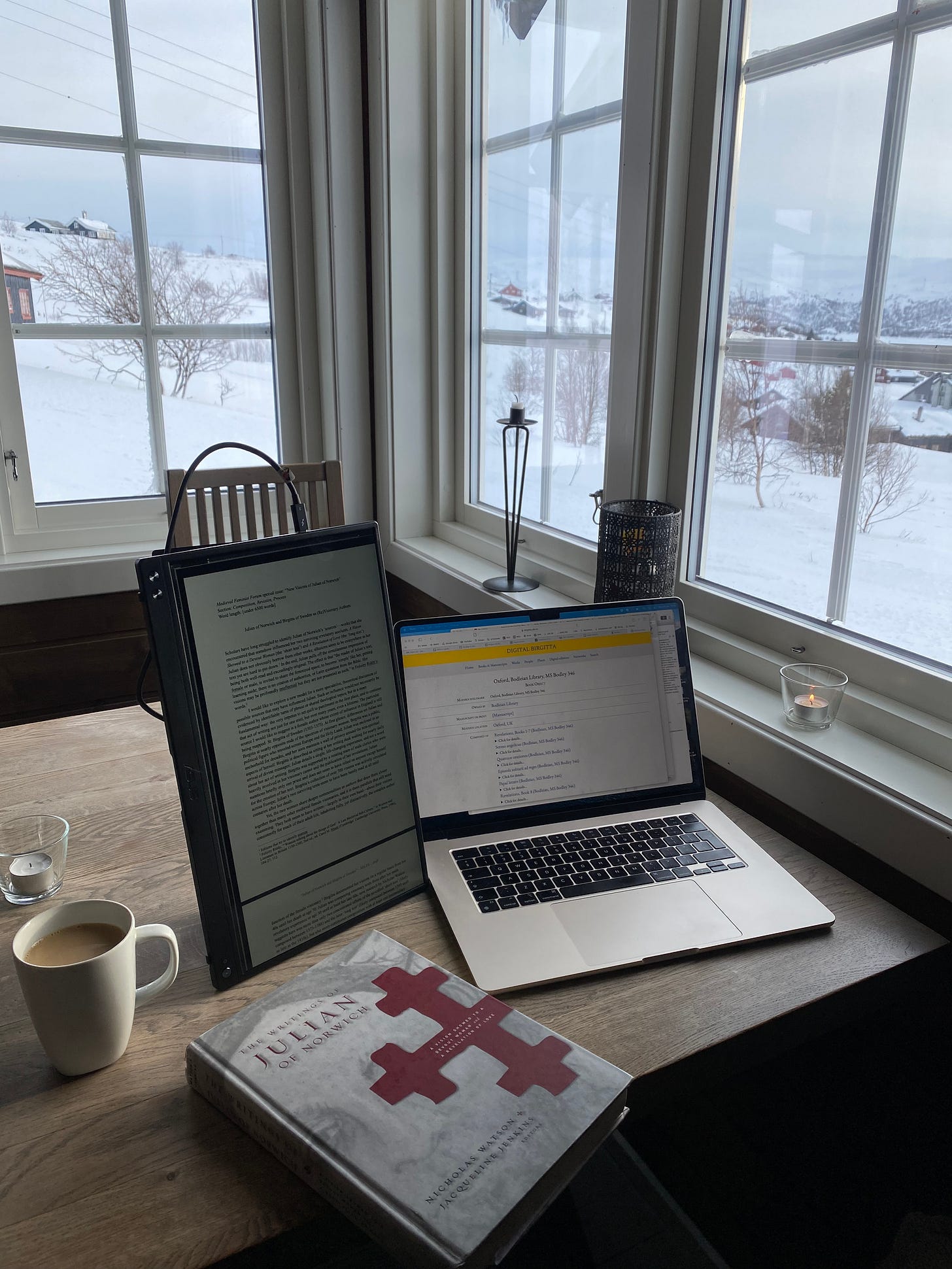Writing retreats can be a cornerstone of a strong writing practice.
I recently spent a few days up at a mountain cabin owned by my university, with half-week and weekend stays allotted by a quarterly lottery. I’ve been entering this lottery for 10 years and finally got a half-week at this one cabin up at Ustaoset, a little snow-locked town almost on the top of the Hardangervidda, almost within view of a few glaciers, and in the winter, navigable only on cross-country skis. I invited two colleague friends—both way way outside my field—and it was a productive and rejuvenating time.
Time for a writing retreat!
I have really grown to love and rely on writing retreats to get enough focused time to produce research. What is a writing retreat? To me, it’s getting out of your normal setting for at least 1 night/2 days, to be in a place where your main duty is to write. When do you need a writing retreat? When your schedule is so full of meetings and teaching that you realise it’s only when you leave town for a conference that you can get anything done. When you’re weary of all your workplace locations, tired of seeing your desk, tired of your everyday surroundings. When you feel like you need a little escape, to get a chance to sit and focus on that writing you’re so excited about.
Retreats offer formally scheduled time where you can gently explain to others, “Sorry, I can’t go to that unnecessary seminar, I’ll be away at a writing retreat.” “Sorry, I can’t explain the essay instructions to you for the 100th time, I’ll be away doing the research part of my job.”
Retreats give yourself a push to say to yourself, “Now, I really AM going to start to draft that chapter / write that part of that article / finish those revisions.”
Writing retreats break you out of your familiar territory, physically and emotionally, and restart your brain for some fresh thinking in a new space where your best writing self is possible—and laundry doesn’t exist.
For me two things are required:
Peace and quiet. No interruptions. No distractions. No meetings. No kids. No noise. No obligations. At most, you have to prepare your own food, but ideally, you somehow get out of all food prep and clean-up entirely.
Outdoor time. Work for a few hours, go on a walk, repeat. Move your body, clear your mind, think about what you’re trying to write, or don’t. Ideally in sublime natural surroundings that inspire you with their beauty.
Two other aspects are desired:
Structure. The more people, the more structure is needed. If it’s just you in a hotel room, work all you want, with some brain breaks and walks. If it’s you and 10 other people at a retreat centre—decide on a workable schedule and stick to it. There are some great resources about retreat schedules that I’ll be coming back to in a future newsletter; Rowena Murray’s Writing in Social Spaces will be up soon.
Company. Going on a retreat with other people can be precisely the friendly support and accountability you need to really buckle down not just for a few hours, but for a whole day several days in a row. I think people outside your immediate field colleagues are perhaps the best: no direct pressure, and you can chat about issues and get a real outside-the-box response.
Last but not least, you’ve got to get a good work-desk set-up:
Lightweight, but spacious, laptop. I recently got a new work laptop with a bigger screen, thought it weighs the same as my previous, much smaller one. I realised that I really needed the screen real-estate if I was going to be writing outside the office more often. It also has a pretty big keyboard so it’s comfortable to use (though still pretty light - 15” MacBookAir M2), and I don’t bother with a travel keyboard and mouse personally.
Second screen. This was a recommendation from a colleague and has been a revelation. It’s the ASUS Zenscreen MB16AHV (though there’s lots others like it). It is really really light, under a kilo including cord and case. It gets power via a USB-C (or A) cable to your laptop, so no extra power cord. It can be horizontal or vertical. I’ve really grown to love it vertical with the piece I’m drafting on it in Word’s ‘FOCUS’ mode, so I can see only the document screen-width and scroll down it easily. Then on my laptop screen I have a note document open or Zotero with reference PDFs or online databases. If I need the second screen up a bit, I just put it on top of one of the books I inevitably end up bringing with.
But there can be challenges. It takes some practice to get everything just right on a retreat, and in a new setting there can be unforeseen issues. For instance, in this winter cabin, there was no wi-fi—it’s really designed for actual vacation and not workation. We just used my phone hot-spot since I have a ton of data, but not ideal. Also, chairs and desks can be a challenge; it’s tough for everyone to find the right height and comfort level. But even if I end up sitting on a couch I can still get a ton done there if the rest of the physical setting—and the view—is amenable. It’s only for a limited time after all.
I have lots more thoughts, tips and tricks about preparing for and carrying out successful writing retreats that I’ll be returning to in future newsletters.
Writing retreats don’t have to be complicated or planned way in advance (though that does help). I realise now that my first writing retreat was very simple, and very effective. In grad school, my friend a year above me in my PhD program was asked to house-sit when one of our professors was out of town, and invited me and a few others to come and spend the days with him. The house was this gorgeous mid-century modern place out in the countryside with lots of windows overlooking a forest complete with babbling brook. We each chose a desk in a different corner of the house—or the annex—and got to work. I remember a wrote my first book review there (it took forever), and I remember the feeling of peace from that beautiful space, and the feeling of writing something I was pleased with. I didn’t realise it at the time but this strategy of getting away has now come to be really pivotal for me.







Two weeks ago, I went on a residency I had recently been granted--I spent a week alone in a cabin the woods in upstate New York. It was magical! Such a great way to recharge and re-vision one's work and/or dive deep into an ongoing project.
Penn State University Press https://www.psupress.org/books/titles/0-271-02547-6.html